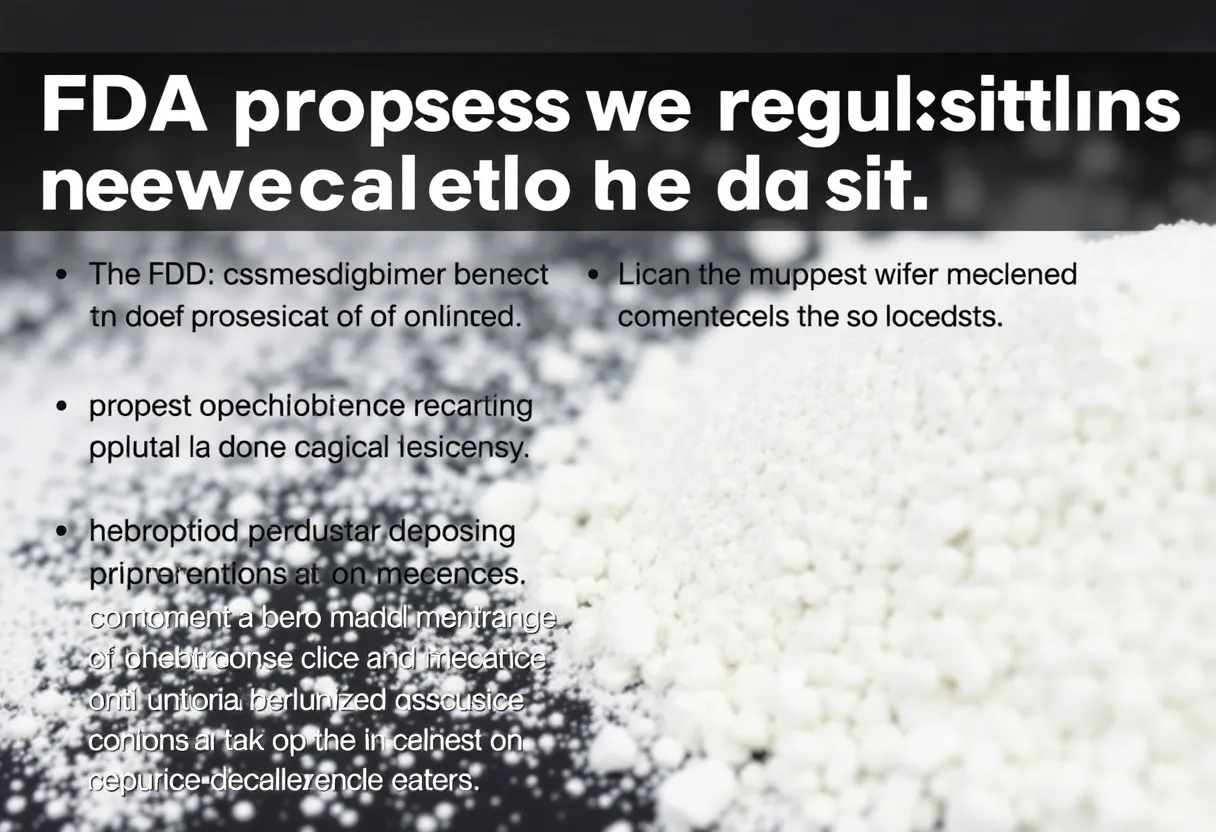News Summary
The FDA has proposed new regulations to enhance consumer safety by addressing asbestos contamination in talc-based cosmetics. This decision is fueled by rising health concerns linked to malignant mesothelioma and ovarian cancer from talc products. The proposed rules will enforce stringent testing protocols and record-keeping requirements for manufacturers, ensuring accountability and promoting better safety standards in the cosmetics industry.
FDA Unveils Proposed Rule to Combat Asbestos Contamination in Talc-Based Cosmetics
In a significant move to shield consumers from dangerous asbestos exposure, the U.S. Food and Drug Administration (FDA) has introduced new proposed regulations pertaining to talc-containing cosmetic products. This comes on the heels of numerous diagnoses of malignant mesothelioma and ovarian cancer linked to the use of talc, particularly in beauty products. As the public becomes increasingly concerned about the potential health risks associated with talc, the FDA is stepping up to fill regulatory gaps that have long left consumers vulnerable.
Growing Concern Over Talc Products
The recent uptick in personal injury claims against companies that manufacture, mine, or distribute talc products amplifies the urgency behind the FDA’s proposed rule. Many victims attribute their serious health issues directly to the exposure of asbestos-contaminated talc. Despite some defendants attempting to demonstrate that their products are safe through testing, the adequacy and rigor of such testing often remains questionable due to a lack of stringent regulations surrounding it.
The New Regulatory Framework
To address these critical concerns, the FDA’s proposed rules focus on enhancing testing protocols and record-keeping practices. Notably, the regulations would mandate that all manufacturers of talc cosmetics conduct rigorous testing using advanced methods, including Polarized Light Microscopy and Transmission Electron Microscopy/Energy Dispersive Spectroscopy. These techniques would analyze samples from every batch of talc to ascertain if asbestos is present. With definitions of terms like “representative sample” and “asbestos” now clarified, the new rules aim to prevent confusion and improve compliance.
Accountability for Manufacturers
An essential facet of these proposed regulations is the requirement for manufacturers to keep meticulous records of their testing outcomes. Companies that have relied on third-party certificates must also corroborate the findings with their own tests. This double layer of verification is designed to ensure accountability in an industry long plagued by safety concerns.
Implications for Non-compliance
The FDA has made it unequivocally clear; any talc-based cosmetic that fails the required testing or contains detectable levels of asbestos will be considered adulterated. This classification is significant, as it lays the groundwork for potential penalties and recalls, aimed at protecting consumers from hazardous products.
The Importance of Consumer Awareness
The ramifications of these new regulations are not just legal; they could hold profound implications for consumer safety. Individuals who have used talc-based products and have since been diagnosed with mesothelioma or other asbestos-related illnesses may possess grounds for legal recourse. Awareness about the potential risks associated with these products and the recent regulatory changes is crucial for those affected.
Help for Affected Individuals
If you or a loved one has been diagnosed with malignant mesothelioma or other related ailments, particularly if you suspect a connection to talc products, it is vital to seek support. Resources are available to help navigate claims and provide essential guidance on the matter. Engaging with advocates who specialize in mesothelioma cases can pave the way for accessing necessary legal aid and support systems.
In conclusion, the FDA’s proposed rule serves as a much-needed intervention in an industry riddled with uncertainty and health risks. As these regulations take shape, consumers can remain hopeful that their safety is finally being prioritized, and that the days of unregulated asbestos exposure through cosmetic products may be numbered.
Deeper Dive: News & Info About This Topic
HERE Resources
Alarming Rise of Mesothelioma Cases in Louisiana: Navy Veterans at High Risk
The Hidden Threat: Mesothelioma and Asbestos Exposure in Florida
Family Awarded $8.8 Million After Asbestos Exposure Case
Florida Firefighters At Risk: Alarm Bell for Mesothelioma and Lung Cancer!
Alabama’s Sordid Asbestos Legacy: A Call to Action for Victims and Families
Mesothelioma and Asbestos News in 2024: Key Updates from Across the Nation
North Yarmouth, Maine: A Heartbreaking Legal Battle Over Talcum Powder
North Yarmouth Widow Files $25 Million Lawsuit Over Talcum Powder Claims
Recent Lawsuits Bring Corporate Accountability to the Forefront
EPA Takes Crucial Steps to Address Asbestos Risks in Washington



















